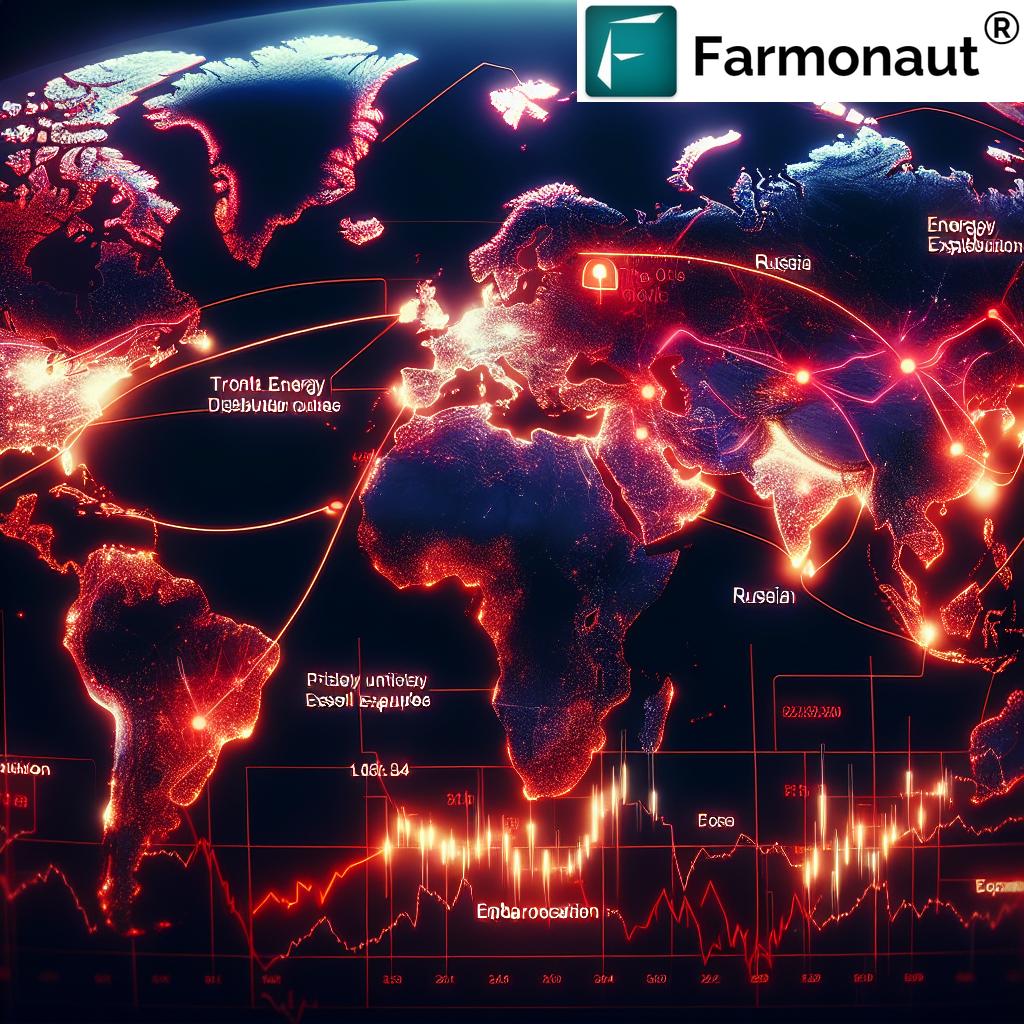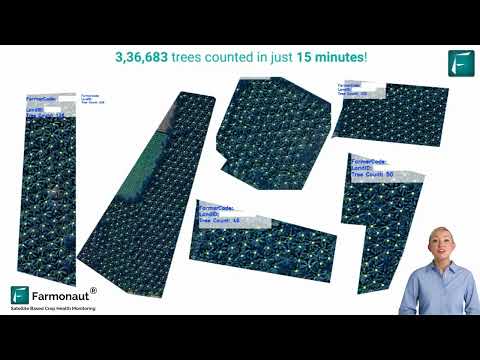Navigating Global Energy Market Volatility: How Sanctions Impact Agricultural Technology and Food Security
“The latest U.S. sanctions against Russia’s energy sector are described as the most significant in the 3-year Ukraine conflict.”
In the ever-evolving landscape of global geopolitics and economics, we find ourselves at a critical juncture where the ripple effects of international sanctions are reshaping the energy market, agricultural technology, and food security worldwide. As representatives of Farmonaut, a pioneering agricultural technology company, we are closely monitoring these developments and their implications for the farming sector.
The United States has recently unveiled a new wave of sanctions targeting Russia’s energy sector, particularly oil and liquefied natural gas (LNG) exports, in response to the ongoing Ukraine conflict. These measures, described as the most significant since the war began, aim to disrupt the Kremlin’s revenue streams and increase economic pressure on Moscow. As we delve into this complex issue, we’ll explore how these sanctions are impacting not only the global energy market but also the agricultural technology landscape and, consequently, food security.
Understanding the New Sanctions
The latest round of US sanctions on the Russian energy sector represents a significant escalation in the economic measures taken against Moscow. These sanctions are designed to target multiple aspects of Russia’s energy industry, including production, refining, and transportation of oil and LNG exports. The strategy focuses on restricting Russian energy capabilities, with potential global implications for oil prices and market volatility.
Key aspects of the sanctions include:
- Restrictions on Russian oil and LNG export capabilities
- Targeting key entities involved in production, refining, and transportation
- Measures to close loopholes that have allowed past sanctions to be circumvented
- Extending restrictions to foreign companies facilitating Russian oil and gas sales
These sanctions are part of a broader strategy to undermine Russia’s financial base and its ability to fund military operations in Ukraine. The U.S. administration, in coordination with European partners and other allies, is implementing these measures to hold Russia accountable for its actions.

Global Energy Market Volatility
The implementation of these sanctions is expected to create significant volatility in the global energy market. As Russia is a major player in the oil and gas sector, any disruption to its exports can have far-reaching consequences. Energy market analysts predict that these measures could lead to:
- Increased oil and gas prices globally
- Supply chain disruptions in energy-dependent industries
- Shifts in global energy trade patterns
- Potential inflationary pressures in various economies
For the agricultural sector, which relies heavily on energy for various operations, this volatility presents both challenges and opportunities. At Farmonaut, we recognize the need for farmers and agribusinesses to adapt to these changing market conditions.
Impact on Agricultural Technology
The energy sector sanctions and resulting market volatility have significant implications for agricultural technology. As a company at the forefront of agritech innovation, we at Farmonaut are particularly interested in how these developments might shape the future of farming practices and technologies.
“These new sanctions target multiple aspects of Russia’s energy industry: production, refining, and transportation of oil and LNG exports.”
Here are some key areas where we expect to see impact:
- Fuel Costs for Farm Equipment: Higher energy prices could lead to increased operational costs for farmers, potentially accelerating the adoption of energy-efficient technologies and practices.
- Precision Agriculture: The need for resource optimization may drive greater demand for precision farming tools, such as those offered by Farmonaut, which help farmers make data-driven decisions to improve efficiency.
- Innovation in Alternative Energy: The volatility in traditional energy markets could spur investment in renewable energy sources for agricultural applications, promoting sustainability in farming practices.
- Satellite-Based Technologies: With potential disruptions in on-ground operations, there might be an increased reliance on satellite-based monitoring and management systems, aligning with Farmonaut’s core offerings.
At Farmonaut, we’re committed to providing solutions that help farmers navigate these challenges. Our satellite-based crop health monitoring and AI-driven advisory systems are designed to optimize resource use and improve farm productivity, even in the face of market volatilities.
Food Security Implications
The ripple effects of energy sanctions extend beyond the agricultural technology sector to impact global food security. As energy prices fluctuate and supply chains face potential disruptions, we may see several consequences:
- Increased food production costs leading to higher consumer prices
- Potential shortages in energy-intensive food products
- Challenges in food transportation and distribution
- Pressure on smallholder farmers in developing countries
These challenges underscore the importance of resilient and efficient agricultural systems. At Farmonaut, we believe that technology plays a crucial role in enhancing food security. Our solutions, such as the Jeevn AI Advisory System, help farmers make informed decisions that can improve crop yields and reduce resource wastage, contributing to more stable food production even in uncertain times.
International Cooperation and Sanctions Effectiveness
The effectiveness of these sanctions largely depends on international cooperation. The United States is working closely with European partners and other allies to implement a coordinated strategy. This collaborative approach aims to:
- Maximize the impact of sanctions on the Russian economy
- Minimize unintended consequences for global markets
- Ensure a united front in response to Russian aggression
- Develop alternative energy sources and supply chains
However, the implementation of these sanctions faces several challenges:
- Balancing Punitive Measures and Economic Stability: The U.S. administration must navigate the delicate balance between applying pressure on Russia and avoiding a spike in consumer energy prices domestically and globally.
- Adapting to Russian Countermeasures: Russia has shown resilience in adapting to previous sanctions, necessitating ongoing refinement of sanction strategies.
- Ensuring Global Compliance: The effectiveness of sanctions relies on widespread adherence, which can be challenging to maintain over time.
- Mitigating Impact on Neutral Parties: Care must be taken to minimize the negative effects on countries and industries not directly involved in the conflict.
At Farmonaut, we recognize the importance of staying informed about these geopolitical developments and their potential impact on the agricultural sector. Our commitment to providing cutting-edge agricultural technology solutions remains steadfast, helping farmers and agribusinesses navigate these challenging times.
Explore Farmonaut’s API for advanced agricultural data
Long-Term Implications for Agricultural Technology and Food Security
As we look beyond the immediate effects of these sanctions, it’s crucial to consider the long-term implications for agricultural technology and global food security. At Farmonaut, we anticipate several key trends and developments:
- Accelerated Technological Adoption: The need for greater efficiency and resilience in agriculture may speed up the adoption of advanced technologies like AI, IoT, and blockchain in farming practices.
- Shift Towards Sustainable Practices: Volatility in energy markets could drive a faster transition to sustainable and renewable energy sources in agriculture, aligning with global climate goals.
- Increased Focus on Local Food Systems: To mitigate risks associated with global supply chain disruptions, there might be a renewed emphasis on developing and strengthening local food production systems.
- Investment in Agricultural Research: Governments and private sectors may increase investment in agricultural research and development to enhance food security and reduce dependence on imports.
- Data-Driven Decision Making: The importance of accurate, real-time data in managing agricultural operations and supply chains will likely grow, favoring platforms that offer comprehensive data analytics.
Farmonaut is well-positioned to support these trends with our suite of advanced agricultural technologies. Our satellite-based monitoring, AI advisory systems, and blockchain-based traceability solutions are designed to help the agricultural sector become more resilient, efficient, and sustainable in the face of global challenges.
Access Farmonaut’s API Developer Docs for integration
Impact on Different Stakeholders in the Agricultural Ecosystem
The effects of these sanctions and the resulting market volatility will be felt differently across various stakeholders in the agricultural ecosystem. Let’s examine how different groups might be affected:
Small-Scale Farmers
- May face challenges due to increased input costs, particularly fuel and fertilizers
- Could benefit from adopting cost-effective precision agriculture tools like those offered by Farmonaut
- Might need support in accessing new technologies and markets
Large Agribusinesses
- Better positioned to absorb short-term market shocks but may need to reevaluate long-term strategies
- Likely to invest more in technology for supply chain resilience and efficiency
- May explore diversification of energy sources and suppliers
Consumers
- Might experience higher food prices due to increased production and transportation costs
- Could see shifts in product availability, potentially leading to changes in consumption patterns
- May show increased interest in locally produced food items
Agritech Companies
- Like Farmonaut, may see increased demand for solutions that enhance efficiency and reduce reliance on traditional energy sources
- Could face challenges in hardware supply chains but opportunities in software and data-driven solutions
- May need to adapt products to address new market needs arising from the changing global situation
At Farmonaut, we’re committed to supporting all these stakeholders through our innovative agricultural technology solutions. Our platform is designed to be scalable and adaptable, catering to the needs of both small-scale farmers and large agribusinesses alike.
The Role of Agricultural Technology in Mitigating Sanctions Impact
In the face of these global challenges, agricultural technology plays a crucial role in mitigating the impact of sanctions and market volatility on food security. Farmonaut’s suite of tools and services are particularly relevant in this context:
- Satellite-Based Crop Health Monitoring: Our advanced monitoring system helps farmers optimize resource use, potentially offsetting increased input costs due to energy price fluctuations.
- AI-Powered Advisory: The Jeevn AI system provides personalized recommendations, helping farmers make informed decisions in a volatile market environment.
- Blockchain-Based Traceability: This feature enhances supply chain transparency, crucial for maintaining trust and efficiency in complex global trade scenarios.
- Resource Management Tools: Our fleet and resource management solutions help agribusinesses optimize operations, potentially reducing the impact of increased fuel costs.
- Carbon Footprinting: This feature supports sustainable practices, which may become increasingly important as energy markets shift.
By leveraging these technologies, farmers and agribusinesses can enhance their resilience to market shocks and maintain productivity even in challenging times.
Comparative Analysis: Impact of Energy Sanctions on Agricultural Technology and Food Security
| Sector | Pre-Sanctions Status | Immediate Impact | Long-Term Projections |
|---|---|---|---|
| Fuel Costs for Farm Equipment | Stable, predictable costs | Sharp increase, potential shortages | Accelerated adoption of energy-efficient technologies |
| Fertilizer Production and Prices | Moderate prices, steady supply | Price spikes, supply chain disruptions | Shift towards alternative fertilizers, precision application |
| Agricultural Technology Research & Development | Steady growth, focused on efficiency | Temporary slowdown due to economic uncertainty | Increased investment in energy-independent solutions |
| Food Transportation Costs | Relatively stable, globally integrated | Significant increase, logistical challenges | Optimization of routes, local food systems growth |
| Global Food Prices | Moderate inflation, regional variations | Sharp increase, potential volatility | Stabilization at higher levels, emphasis on food security |
| Investment in Sustainable Farming Practices | Growing interest, limited widespread adoption | Increased focus due to energy concerns | Mainstream adoption, policy-driven initiatives |
This table illustrates the multifaceted effects of energy sanctions on various aspects of agriculture and food security. It underscores the need for adaptive strategies and innovative solutions in the face of these challenges.
The Way Forward: Adapting to a New Agricultural Landscape
As we navigate this period of global energy market volatility and its impacts on agricultural technology and food security, several key strategies emerge for stakeholders in the agricultural sector:
- Embrace Technological Innovation: Invest in and adopt technologies that enhance efficiency and reduce dependency on traditional energy sources. Farmonaut’s suite of tools offers a prime example of how technology can drive resilience in agriculture.
- Diversify Energy Sources: Explore alternative and renewable energy options for agricultural operations to mitigate the impact of fossil fuel price volatility.
- Enhance Supply Chain Resilience: Utilize blockchain and traceability solutions to create more transparent and adaptable supply chains.
- Focus on Sustainability: Implement practices that not only reduce energy consumption but also promote long-term environmental sustainability.
- Collaborate and Share Knowledge: Foster partnerships between farmers, technology providers, and policymakers to develop comprehensive solutions to emerging challenges.
At Farmonaut, we’re committed to supporting this adaptation process through our innovative technologies and data-driven insights. By leveraging our platform, agricultural stakeholders can make informed decisions, optimize their operations, and contribute to a more resilient global food system.
Conclusion
The new wave of U.S. sanctions targeting Russia’s energy sector marks a significant moment in global geopolitics, with far-reaching implications for agricultural technology and food security. As we’ve explored, these sanctions are likely to create volatility in energy markets, affecting everything from farm equipment costs to global food prices.
However, this period of change also presents opportunities for innovation and adaptation in the agricultural sector. Technologies like those offered by Farmonaut – including satellite-based crop monitoring, AI-driven advisory systems, and blockchain-based traceability – are poised to play a crucial role in helping farmers and agribusinesses navigate these challenges.
As we move forward, the key to resilience will be embracing technological solutions that enhance efficiency, promote sustainability, and provide data-driven insights. By doing so, we can work towards a future where agriculture is not only more resistant to global market shocks but also more productive and sustainable.
At Farmonaut, we remain committed to driving this technological revolution in agriculture, helping to ensure food security and agricultural prosperity in an ever-changing global landscape.

Frequently Asked Questions (FAQ)
- How do energy sanctions affect agricultural technology?
Energy sanctions can lead to increased fuel and fertilizer costs, driving demand for energy-efficient agricultural technologies and precision farming tools. - What role does Farmonaut play in addressing these challenges?
Farmonaut provides satellite-based crop monitoring, AI advisory systems, and resource management tools that help farmers optimize operations and reduce energy dependency. - How might food security be impacted by these sanctions?
Sanctions can lead to higher food production costs and potential supply chain disruptions, potentially affecting food availability and prices globally. - What can farmers do to mitigate the effects of energy market volatility?
Farmers can adopt precision agriculture techniques, explore alternative energy sources, and utilize data-driven decision-making tools to optimize resource use. - How does blockchain technology contribute to agricultural resilience?
Blockchain enhances supply chain transparency and traceability, helping to maintain efficiency and trust in complex global trade scenarios affected by sanctions.
Earn With Farmonaut: Affiliate Program
Earn 20% recurring commission with Farmonaut’s affiliate program by sharing your promo code and helping farmers save 10%. Onboard 10 Elite farmers monthly to earn a minimum of $148,000 annually—start now and grow your income!
Farmonaut Subscriptions







